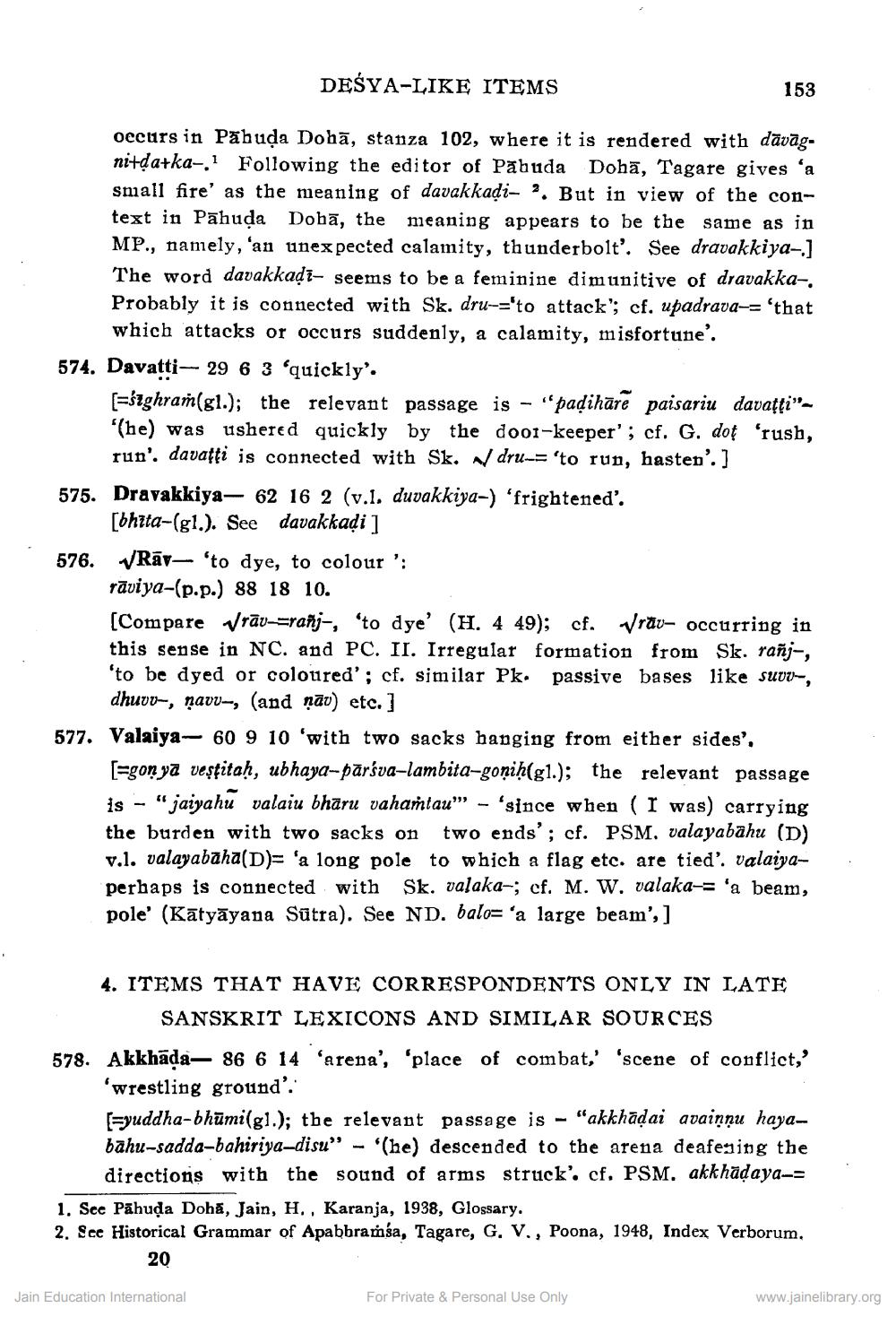________________
DEŚYA-LIKE ITEMS
153
occurs in Păbuda Dobā, stanza 102, where it is rendered with dāvāgni+da+ka-,1 Following the editor of Pabuda Dohā, Tagare gives 'a small fire' as the meaning of davakkadi- 2. But in view of the context in Pāhuda Dobā, the meaning appears to be the same as in MP., namely, 'an unexpected calamity, thunderbolt'. See dravakkiya-]
The word davakkadi- seems to be a feminine dimunitive of dravakka-. Probably it is connected with Sk, dru-='to attack'; cf. upadrava-= 'that
which attacks or occurs suddenly, a calamity, misfortune. 574. Davatti— 29 6 3 'quickly'.
[=śtghram(gl.); the relevant passage is - "padihāre paisariu davațţi""(he) was ushered quickly by the doo1-keeper'; cf. G. dot 'rush,
run'. davati is connected with Sk. Ndru--= 'to run, hasten'. ] 575. Dravakkiya— 62 16 2 (v.l. duvakkiya-) 'frightened'.
[bhita-(gl.). See davakkadi ] 576. VRāv- 'to dye, to colour ':
rāviya-(p.p.) 88 18 10. [Compare Vrāv-=ran-, 'to dye' (H. 4 49); cf. Vrav- occurring in this sense in NC. and PC. II. Irregular formation from Sk. rañj-, 'to be dyed or coloured'; cf. similar Pk. passive bases like suur-,
dhuvr-, ņavu-, (and ņāu) etc.] 577. Valaiya- 60 9 10 'with two sacks hanging from either sides',
[=gonya vestitaḥ, ubhaya-parsva-lambita-goniḥ(gl.); the relevant passage is - "jaiyahu valaiu bhāru vahaṁtau"" - 'since when (I was) carrying the burden with two sacks on two ends'; cf. PSM, valayabahu (D) v.l. valayabaha(D)= 'a long pole to which a flag etc. are tied'. valaiyaperhaps is connected with Sk. valaka-; cf. M. W. valaka-= 'a beam, pole' (Kātyāyana Sūtra). See ND. balo= 'a large beam', ]
4. ITEMS THAT HAVE CORRESPONDENTS ONLY IN LATE
SANSKRIT LEXICONS AND SIMILAR SOURCES 578. Akkhāda- 86 6 14 'Arena', 'place of combat,' 'scene of conflict,'
'wrestling ground'. [=yuddha-bhūmi(gl.); the relevant passage is - "akkhādai avainnu hayabahu-sadda-bahiriya-disu” – '(he) descended to the arena deafening the
directions with the sound of arms struck'. cf. PSM. akkhadaya-- 1. Sce Pāhuda Dohā, Jain, H., Karanja, 1938, Glossary. 2. Sce Historical Grammar of Apabbramsa, Tagare, G. V., Poona, 1948, Index Verborum,
20
Jain Education International
For Private & Personal Use Only
www.jainelibrary.org




